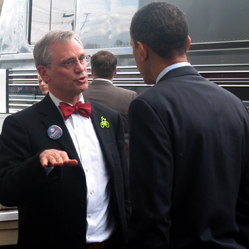Congressman Earl Blumenauer of Oregon thinks that an Obama administration, working with Congress, could effect change and create a new vision to Rebuild and Renew America.
 These tumultuous times, and an unprecedented campaign, have produced a singular President who will face some of the most difficult challenges since President Franklin Roosevelt, maybe even President Lincoln. To be transformational, President Obama must implement a transformed policy agenda.
These tumultuous times, and an unprecedented campaign, have produced a singular President who will face some of the most difficult challenges since President Franklin Roosevelt, maybe even President Lincoln. To be transformational, President Obama must implement a transformed policy agenda.
The list of challenges is daunting; our economic crisis, security threats, energy instability, water stress and global warming all threaten our way of life as we have known it. Our decaying infrastructure continues to undermine the health and economies of our communities, making each challenge worse. Yet this urgent need to upgrade and expand our aging transportation, water, sewer, and energy transmission systems also presents us with key opportunities. Sustainability is both the measure and the cure. With the right approach and investments, we can rebuild the American economy as well as our political and social fabric.
Whether the new administration and Congress will be equal to the challenge will be determined by the willingness to revitalize government itself. The Farm Bill showed how powerful special interests and inertial forces in government can overcome do-gooders, editorial writers, and even a Presidential veto. The new administration should work with Congress to avoid the same fate by making strategic investments in infrastructure the centerpiece of its economic and environmental policy.

We need a new vision to Rebuild and Renew America, just as Presidents Thomas Jefferson and Teddy Roosevelt had in centuries past. No more "Bridges to Nowhere" as we align our policies and resources to meet our priorities rather than our politics.
We should focus on getting more value out of the dollars we invest, not just more money to spend. Our problems are not because we don't spend enough on healthcare, education, energy, or defense. No other country invests as much as we do in these areas. The issue is when, how, and on what we spend.
- One way to get more value is to consume less time in unnecessary processes. By creating performance-based, rather than regulation-driven, environmental and citizen protections, we can secure enthusiastic support from a broad range of interests, including environmentalists, local governments and business interests. If we make it abundantly clear that our performance will be measured by reducing our carbon footprint and oil dependence, we can create jobs and save money while we protect the planet.
- Government itself must lead by example. For instance, the federal government has created and still owns more superfund sites than any entity in the United States. If the federal government assumes, rather than avoids, the responsibility for cleaning up these toxic sites, we can return millions of polluted and contaminated acres to productive use. The federal government should also be the national leader in energy efficiency. By definition, federal departments and agencies will be in business for centuries to come. By putting state-of-the art conservation programs in place in federal agencies now, we'll stimulate the marketplace for more efficient products, buildings, and services. The federal government will save money, and taxpayers will benefit.
- It's past time to modernize the federal budget process. The lack of a capital budget and the failure to account for present value and life-cycle costs discourages investments that will actually pay for themselves. Reformed budget rules will not just make our accounting more accurate, it will save money, reduce energy demands and fight global warming.
The good news is that there is an emerging consensus about what this grand vision should look like and the elements it should contain. The "experts" and the public are largely in agreement about budget priorities, social equity, and community outcomes.
The best news is that we can revitalize the economy and protect the planet while ushering in a new political era. These solutions are not inherently partisan or ideological. Red-state, small-town America can benefit from these investments every bit as much as Blue mega-regions. By bringing us together to Rebuild and Renew America, the Obama Administration can help make all of our communities stronger and all of our families safer, healthier, and more economically secure.
Earl Blumenauer represents the Third Congressional District of Oregon in the U.S. House of Representatives.

Maui's Vacation Rental Debate Turns Ugly
Verbal attacks, misinformation campaigns and fistfights plague a high-stakes debate to convert thousands of vacation rentals into long-term housing.

Planetizen Federal Action Tracker
A weekly monitor of how Trump’s orders and actions are impacting planners and planning in America.

Chicago’s Ghost Rails
Just beneath the surface of the modern city lie the remnants of its expansive early 20th-century streetcar system.

Bend, Oregon Zoning Reforms Prioritize Small-Scale Housing
The city altered its zoning code to allow multi-family housing and eliminated parking mandates citywide.

Amtrak Cutting Jobs, Funding to High-Speed Rail
The agency plans to cut 10 percent of its workforce and has confirmed it will not fund new high-speed rail projects.

LA Denies Basic Services to Unhoused Residents
The city has repeatedly failed to respond to requests for trash pickup at encampment sites, and eliminated a program that provided mobile showers and toilets.
Urban Design for Planners 1: Software Tools
This six-course series explores essential urban design concepts using open source software and equips planners with the tools they need to participate fully in the urban design process.
Planning for Universal Design
Learn the tools for implementing Universal Design in planning regulations.
planning NEXT
Appalachian Highlands Housing Partners
Mpact (founded as Rail~Volution)
City of Camden Redevelopment Agency
City of Astoria
City of Portland
City of Laramie


























